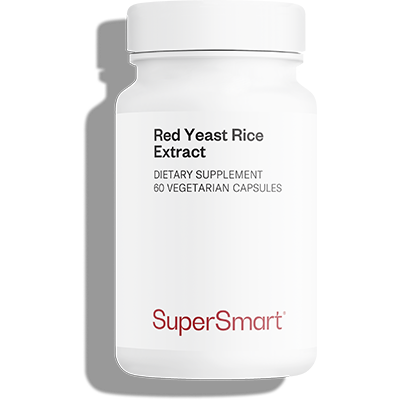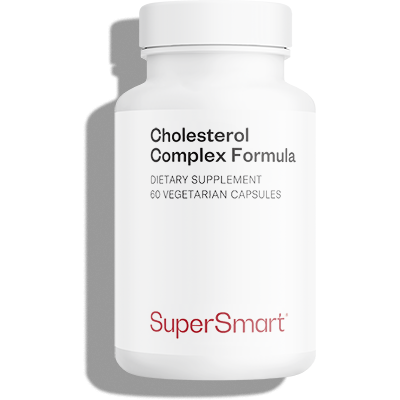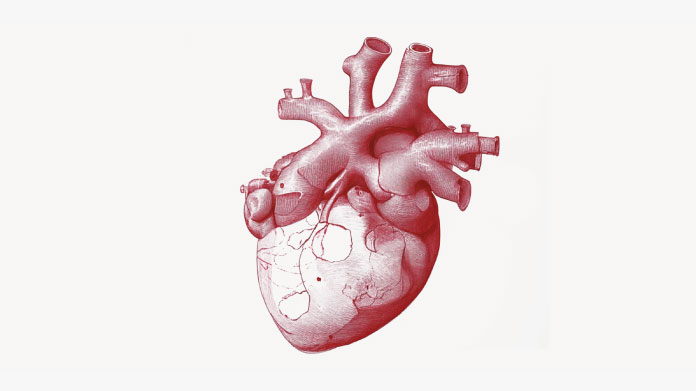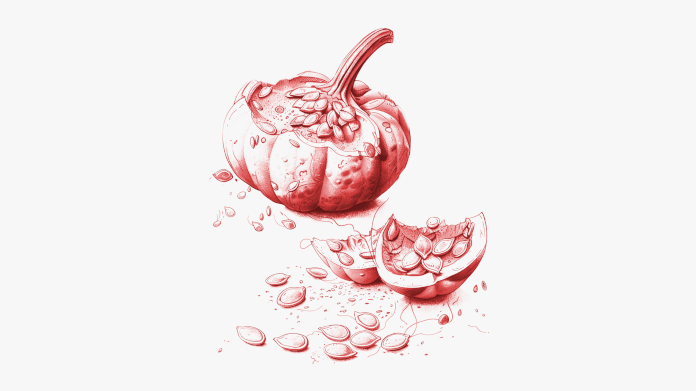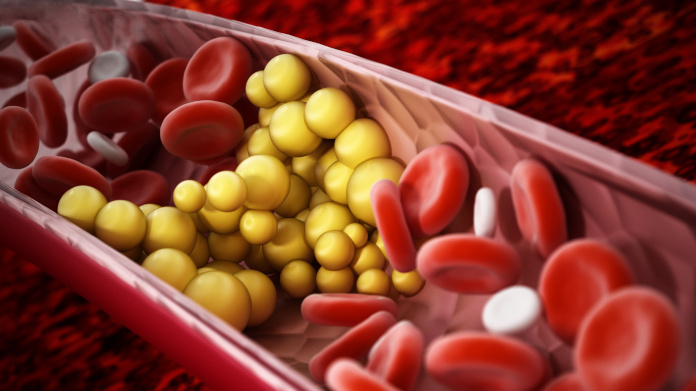Cholesterol: researchers discover an ultra-efficient natural approach
While statins are effective against cholesterol, their side effects are a problem. What if a completely new natural approach, with effects validated by 4 clinical studies, changed all that?

Excess cholesterol: why avoid conventional statins?
Statins belong to the family of lipid-lowering drugs.
Their aim is to lower levels of LDL cholesterol, the ‘bad cholesterol’, by inhibiting an enzyme called HMG-CoA reductase, which is involved in its synthesis (1).
These treatments are generally prescribed for patients suffering from hypercholesterolaemia who are recalcitrant to dietary measures, or who are considered to be at high cardiovascular risk, in particular with a view to preventing myocardial infarctions or strokes.
While doctors agree that statins are effective, they can cause several side effects, including digestive problems, headaches, fatigue and dizziness.
In the most severe cases, they can cause liver damage (marked by an increase in transaminases) or disabling muscular pain (2).
All these findings have prompted researchers to find natural, safe and proven alternatives.
A revolutionary fermented red yeast rice, without statins
Classic red yeast rice, which goes by the scientific name of Monascus purpureus, has long been considered the ideal candidate because of its content of monacolins, ‘natural statins’ (this is the yeast used, for example, in our standard Red Yeast Rice Extract formula) (3).
The problem is that these monacolins do not completely resolve the issue of side effects, which persist in some subjects (4).
However, researchers seem to have found a way around this obstacle with a completely new approach: the patented extract of Ankascin® 568-P fermented red yeast rice.
This differs from conventional red yeast rice in that it contains no monacolins (which guarantees excellent tolerance) and also has a unique mechanism of action.
It contains exclusive bioactive compounds, monascin and ankaflavin, which are thought to activate certain transcription factors (PPARɣ and Nrf2) involved in regulating metabolism (cholesterol levels, blood sugar, etc.) and oxidative stress (5).
Ankascin® 568-P: a broad spectrum of action confirmed by 4 clinical studies
Ankascin® 568-P is thought to have a much broader action than ordinary red yeast rice, acting not only on all components of the lipid profile (LDL cholesterol, HDL cholesterol and triglycerides) but also on blood pressure and blood sugar levels.
No fewer than 4 randomised, double-blind clinical studies confirm its remarkable efficacy.
An initial study involving 39 participants taking 440 mg of Ankascin® 568-P a day showed a reduction in total cholesterol of 11.9% and LDL cholesterol of 19% in 4 weeks (6).
What's more, an increase in 'good' HDL cholesterol was also noted — a benefit not seen with monacolins, and attributed by the researchers to the presence of monascin in the fermented version.
The other studies were conducted with higher doses of 880 mg of Ankascin® 568-P per day.
One of them, involving 39 subjects with pre-diabetes, showed a significant 8.5% reduction in fasting blood glucose levels after 6 weeks of supplementation, and 9.3% after 12 weeks (7).
Triglyceride levels followed the same trend, falling by more than 20% after 12 weeks.
Another study looked at the effects of Ankascin® 568-P on blood pressure in 21 people with mild to moderate hypertension.
After 8 weeks, participants in the test group showed a reduction in mean systolic and diastolic blood pressure of 5.75% and 8.14% respectively (8).
What should Ankascin® 568-P be combined with to optimise its efficacy?
Artichoke (Cynara scolymus) is known to help control weight and has been at the heart of many slimming diets.
However, we forget that it also contributes to heart and liver health, with its cynarin-rich leaves helping to regulate blood lipid levels (9).
It is thought to limit the production of cholesterol in the liver by facilitating its elimination via the bile and protecting LDL from oxidation (which causes deposits to build up on artery walls).
A systematic review supports its synergistic association with lipid-lowering treatments (10).
Isolated mainly from sugar cane wax, policosanols combine several long-chain fatty acids (octacosanol, triacontanol, hexacosanol, etc.).
While their mode of action has yet to be clarified, research suggests that they may interfere with hepatic cholesterol synthesis by a mechanism distinct from that of statins.
They are also thought to have particularly promising effects on platelet aggregation and LDL oxidation, but these properties need to be further investigated by additional studies (11).
Our cutting-edge Cholesterol Complex Formula has therefore chosen to combine Ankascin® 568-P (in a potent dose of 440 mg per capsule) with an extract of artichoke stem leaves (richer in lipid-lowering active compounds than other parts of the plant) and the above-mentioned policosanols.
SUPERSMART ADVICE
References
- Sizar O, Khare S, Patel P, et al. Statin Medications. [Updated 2024 Feb 29]. In: StatPearls [Internet]. Treasure Island (FL): StatPearls Publishing; 2025 Jan-. Available from: https://www.ncbi.nlm.nih.gov/books/NBK430940/Sizar O, Khare S, Patel P, et al. Statin Medications. [Updated 2024 Feb 29]. In: StatPearls [Internet]. Treasure Island (FL): StatPearls Publishing; 2025 Jan-. Available from: https://www.ncbi.nlm.nih.gov/books/NBK430940/
- Bełtowski J, Wójcicka G, Jamroz-Wiśniewska A. Adverse effects of statins - mechanisms and consequences. Curr Drug Saf. 2009 Sep;4(3):209-28. doi: 10.2174/157488609789006949. Epub 2009 Sep 1. PMID: 19534648.
- Cicero AFG, Fogacci F, Banach M. Red Yeast Rice for Hypercholesterolemia. Methodist Debakey Cardiovasc J. 2019 Jul-Sep;15(3):192-199. doi: 10.14797/mdcj-15-3-192. PMID: 31687098; PMCID: PMC6822657.
- Norata GD, Banach M. The Impact of Red Yeast Rice Extract Use on the Occurrence of Muscle Symptoms and Liver Dysfunction: An Update from the Adverse Event Reporting Systems and Available Meta-Analyses. 2024 Feb 2;16(3):444. doi: 10.3390/nu16030444. PMID: 38337728; PMCID: PMC10857633.
- Hsu WH, Chen TH, Lee BH, Hsu YW, Pan TM. Monascin and ankaflavin act as natural AMPK activators with PPARα agonist activity to down-regulate nonalcoholic steatohepatitis in high-fat diet-fed C57BL/6 mice. Food Chem Toxicol. 2014 Feb;64:94-103. doi: 10.1016/j.fct.2013.11.015. Epub 2013 Nov 22. PMID: 24275089.
- Liu SF, Wang YR, Shen YC, Chen CL, Huang CN, Pan TM, Wang CK. A randomized, double-blind clinical study of the effects of Ankascin 568 plus on blood lipid regulation. J Food Drug Anal. 2018 Jan;26(1):393-400. doi: 10.1016/j.jfda.2017.04.006. Epub 2017 Jun 1. PMID: 29389579; PMCID: PMC9332664.
- Wang YR, Liu SF, Shen YC, Chen CL, Huang CN, Pan TM, Wang CK. A randomized, double-blind clinical study to determine the effect of ANKASCIN 568 plus on blood glucose regulation. J Food Drug Anal. 2017 Apr;25(2):409-416. doi: 10.1016/j.jfda.2016.06.011. Epub 2016 Jul 30. PMID: 28911684; PMCID: PMC9332536.
- Chen CL, Tseng JH, Pan TM, Hsiao SH. A Randomized, Double-Blind Clinical Study on Blood Pressure Reduction and Blood Lipid Profile Amelioration on Treatment with Ankascin 568. Chin J Physiol. 2017 Jun 30;60(3):158-165. doi: 10.4077/CJP.2017.BAF452. PMID: 28628970.
- Bundy R, Walker AF, Middleton RW, Wallis C, Simpson HC. Artichoke leaf extract (Cynara scolymus) reduces plasma cholesterol in otherwise healthy hypercholesterolemic adults: a randomized, double blind placebo controlled trial. 2008 Sep;15(9):668-75. doi: 10.1016/j.phymed.2008.03.001. PMID: 18424099.
- Sahebkar A, Pirro M, Banach M, Mikhailidis DP, Atkin SL, Cicero AFG. Lipid-lowering activity of artichoke extracts: A systematic review and meta-analysis. Crit Rev Food Sci Nutr. 2018;58(15):2549-2556. doi: 10.1080/10408398.2017.1332572. Epub 2017 Aug 24. PMID: 28609140.
- Gouni-Berthold I, Berthold HK. Policosanol: clinical pharmacology and therapeutic significance of a new lipid-lowering agent. Am Heart J. 2002 Feb;143(2):356-65. doi: 10.1067/mhj.2002.119997. PMID: 11835043.
Keywords
11 Hours
great experience
Easy ordering, fast deliver, very professionally.
Natasa
3 Days
this company and its products are…
this company and its products are perfect: I have been their customer for three years , prices are reasonable for the high quality they offer , the products are of very good quality not just plainly "normal" , delivery is quite fast. we are very satisfied with them.
Gabriel Diacakis
4 Days
TOP service TOP products will buy again…
TOP service TOP products will buy again and again
PINOTTI Giorgio
6 Days
Trustworthy company with tested products
Trustworthy company with tested products
Trusted
10 Days
Efficiency and speed
Efficiency and speed
Cuccie
12 Days
GOOD BRAND IN FOOD COMPLEMENTS
GOOD BRAND IN FOOD COMPLEMENTS - SERIOUS WITH GOOD DOCUMENTS AND DETAILS SCIENTIST. AND SERIOUS HONNEST COMMERZIALISATION. I HAVE TRUST IN THEIR PRODUCTS.
FENOGLIO Guy
13 Days
Very good experience
Very good experience, the products arrived in time, in perfect condition and are good quality. Thank you.
GABI TIRCOCI
19 Days
very good expereince
very good expereince
Jelena Đaković
19 Days
Very good products.
Very good products.
Agnes BENDSAK
21 Days
Just OK
Just OK, ordering from company for many years and being safisfied
Lynn Mae
22 Days
Recomendo
Produtos encomendados são recebidos atempadamente e de acordo com o anunciado! Muito satisfeita!
Carla Sofia
22 Days
Everything is great!
Everything is great!
Jonas
27 Days
The delivery was fast and the product…
The delivery was fast and the product is great
SOMMARIVA Gianni
29 Days
Great service and lots of information
Great service and lots of information
Gabi
32 Days
Service Satisfaction
I’m satisfied with the service; it fulfilled what it set out to do.
Anfhony Abreu
of experience
your money back
##montant## purchase


